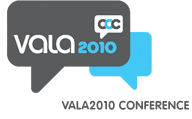 Blending evolution with revolution: a new cycle of library automation spins on.
Blending evolution with revolution: a new cycle of library automation spins on.
VALA 2010 PLENARY 3: Marshall Breeding
Wednesday 10 February 2010, 08:45 – 09:55
Persistent URL: http://www.vala.org.au/vala2010-proceedings/vala2010-plenary-3-breeding
 Marshall Breeding
Marshall Breeding
Director for Innovative Technologies and Research, Vanderbilt University Libraries, Nashville, USA
http://staffweb.library.vanderbilt.edu/breeding and http://www.librarytechnology.org
 Please tag your comments, tweets, and blog posts about this plenary presentation: #VALA2010
Please tag your comments, tweets, and blog posts about this plenary presentation: #VALA2010
- VALA2010 Plenary 3 Breeding Presentation 5.49 MB
Abstract
Based on his ongoing research and analysis of the product, technology, and business trends of the library automation industry, Marshall Breeding will give his perspective on the current state of the field and what libraries can expect over the next few years. While some companies will continue a stable and evolutionary path, others articulate more dramatic changes in their strategies. Open source ILS options have already repainted the landscape, with new community source projects underway that promise additional change. The industry drives forward on two fronts, one focusing on automating internal library processes and the other providing new ways for users to discovery and access library collections. Major tech trends such as the rapid rise in smart mobile devices, the shift from local computing to platform-as-a-service cloud computing bring new mandates of change that demand new directions of innovation. These cycles all turn within an economic climate that presents great challenges in the levels of resources that libraries can bring to the table.

 Blending evolution with revolution: a new cycle of library automation spins on.
Blending evolution with revolution: a new cycle of library automation spins on.